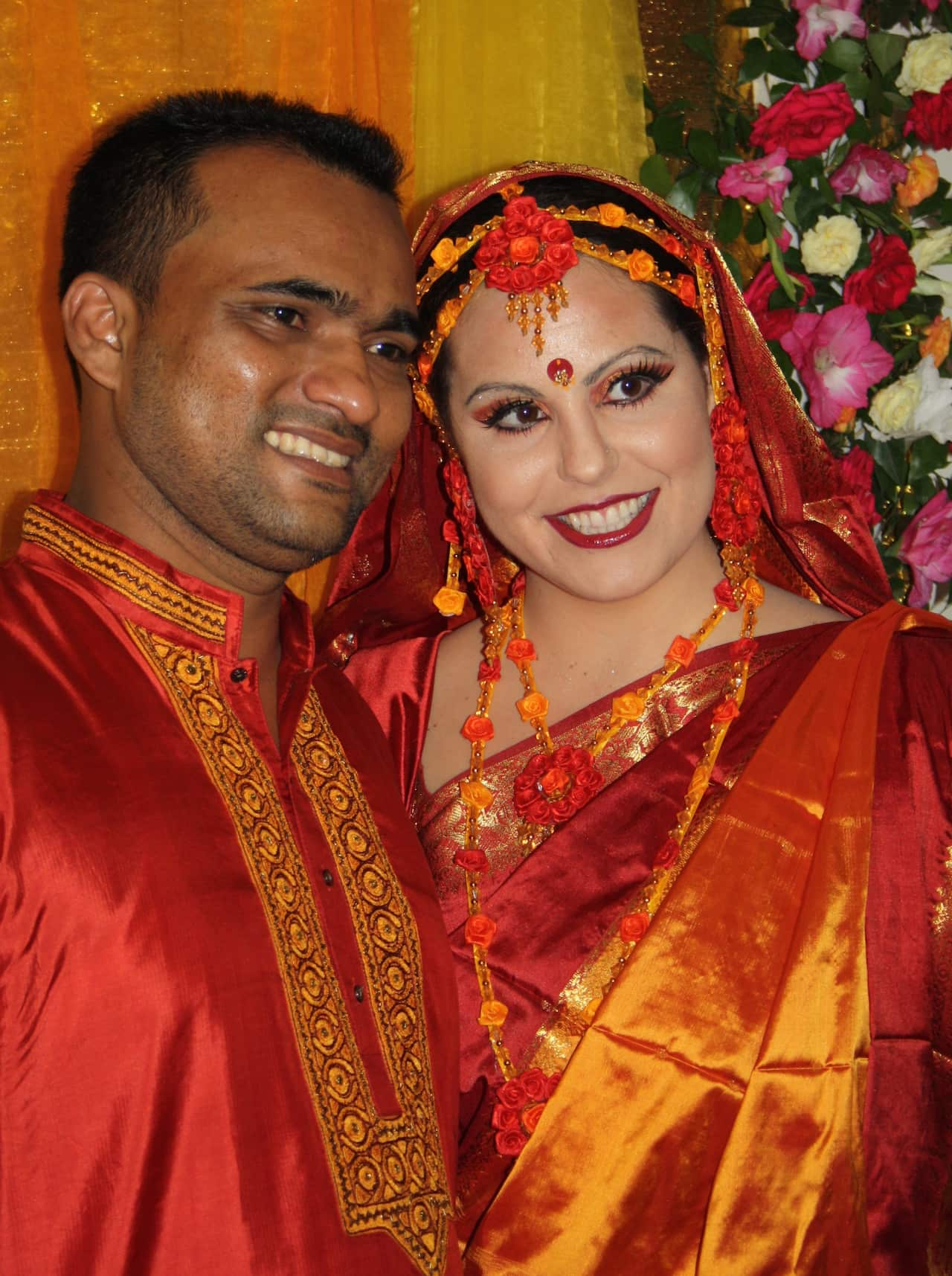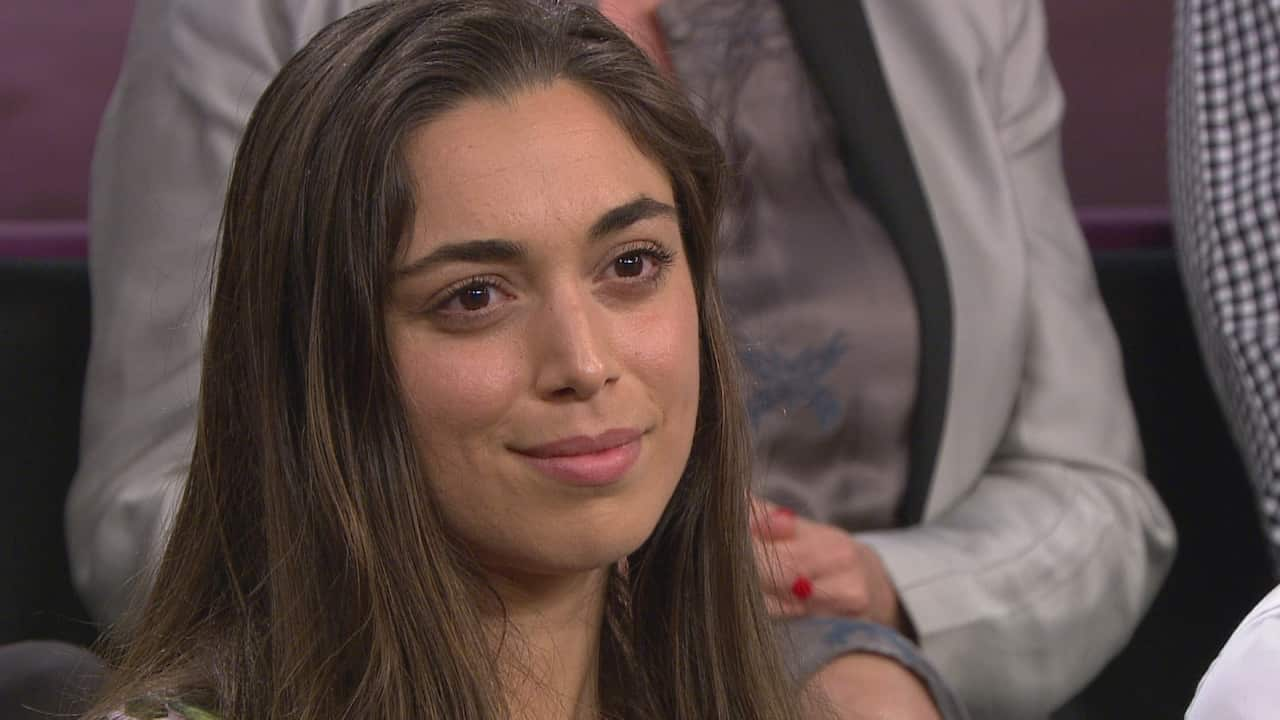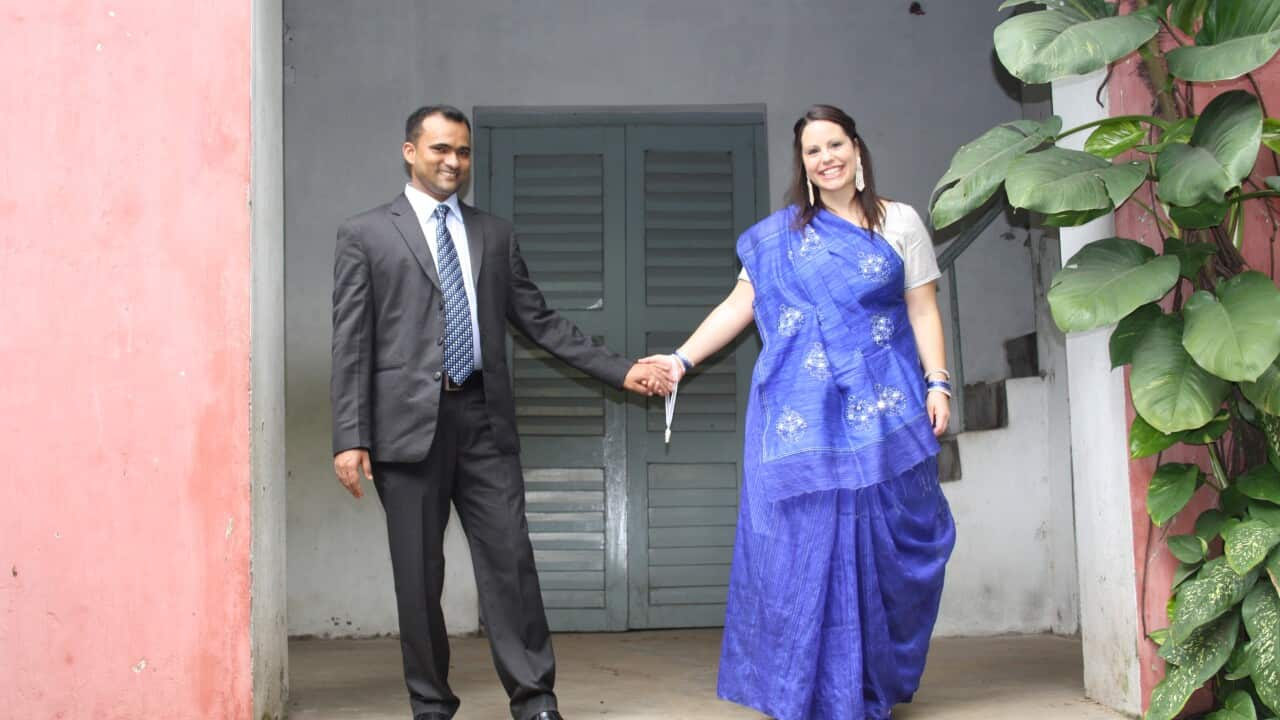Shumon Ahsan had spent most of his life in rural Bangladesh as a social worker, occasionally working for overseas NGOs as a local fixer and regularly attending the mosque with his large Muslim family.
He’d never been outside the country and as his sisters and brothers married off ahead of him – Shumon showing little interest in finding a girlfriend, let alone a wife – his mother began to wonder if he’d ever settle down.
That was 2009. Today, he is married to Lucinda Garrido: a 32 year old Melbourne local, Caucasian and Christian and very much in love.
How does such a relationship withstand the pulls and pushes of different religions and cultures? It’s a timeless question.
Despite Australia’s familiarity with multiculturalism, the country still seems to find cross-cultural relationships difficult.
“It surprised me very much,” clinical psychologist, Siham Yahya, told Insight’s Jenny Brockie. Her specialty in mixed marriages saw her do research into university students’ attitudes towards interfaith and intercultural relationships. While most people were accepting of others’ relationships, many said they’d be reluctant to start one of their own.
“I was expecting something different in Australia [to similar research overseas] because of the multicultural way of things here. But I think people do adhere to their cultural values and to their religious values and are afraid of things being different.”
Not all, however, are so cautious.
Two couples spoke with Insight for the first episode of 2016, about the challenges they have faced, and ultimate success they have achieved, in their cross-cultural love.
Lucinda Garrido and Shumon Ahsan
She was an aid worker; he, her local fixer and colleague. During the day they worked together on local projects in southern Bangladesh, and at night he’d help her and her housemates settle in: fixing things around the house, setting up utilities and helping them navigate life in a foreign country.
They knew they had similar world views, values and morals.
And then there was a spark.
Neither was quite sure what it was, but when Lucinda returned home they kept in touch.
“We always knew that we got along very well. We could talk very easily, we could laugh with each other and have a great time. I guess over Skype we were taking things a little but further, getting to know each other a bit more,” says Lucinda.
She decided to take the plunge and headed back to Bangladesh in 2009. She called Shumon.
"I was halfway through eating my dinner,” recalls Ahsan, when he got the phone call. “I didn’t finish it. I ran to see her.”
He knew something was different this time, and that it was love.

But there were many barriers.
They couldn’t breeze through a few dates, test the water, see if the connection persisted; Shumon’s faith and culture prevented him from dating.
“Knowing that he wasn’t able to date, I had to make a decision quite quickly as to whether we were going to make a commitment to each other,” says Lucinda.
It was marriage, or nothing at all.
And so, for ten days, they holed themselves up in a private resort and hashed out how their love was going to work. Everything was on the table: would they convert faiths? Where would they live? Would they have children? Which religion and language would they bring them up in? Was the connection they’d felt all those years ago still there, and strong?
Knowing that he wasn’t able to date, I had to make a decision quite quickly as to whether we were going to make a commitment to each other. - Lucinda Garrido
Eventually, Shumon’s mother and siblings gave them their blessing. Many people in Shumon’s circles didn’t take them seriously, however, and Lucinda had some trouble convincing family and friends of her new-found love.
“It was really about trying to show them how much I had thought about it and considered all the different scenarios and that I was really sure of the decision I was making.”
Still, not all the difficulties could be accounted for; especially once they'd move to Australia.
“I didn’t anticipate that everything would be so challenging – culturally, religiously, socially,” says Shumon. “Everything is different actually.”
“When I first came to Australia, I actually felt like I was just a new born baby.”
Toilets, traffic lights, public transport: all had to be learnt.
“I thought I had mentally prepared,” says Lucinda, “but I hadn’t. Even things like opening a carton of milk, I had to show him how to do that. You know, he’d try and open a package but just rip through it. Teaching him how to do the housework.”
“At the start if was every hour coming across something that I needed to teach him, so it was very overwhelming and tiring, and we still come across things.”
Even as Shumon learns the intricacies of Australian society, he’s clung fiercley to Bangladeshi tradition.
And perhaps this is the key, for Lucinda and Shumon at least, to impenetrable love: individuality.
It started with the law they were married under in Bangladesh – the Atheist Act – which allowed them to keep their separate religions without converting. They tracked down the only person in Bangladesh who could officiate the ceremony, both stressing how important it was to keep their faiths.
And it has continued to everyday life: they eat different foods, watch different television shows, have different routines and very distinct sides to the bed.
“I think we embrace the challenges a lot better and we can laugh at them [now] … We don’t notice the differences as much and really our lives have come together.”
At the heart of the relationship is an acknowledgement that, despite their divergent habits and tastes, is a genuine acceptance and love of each others’ difference.
“I always say I live with one foot in Australia and one foot in Bangladesh, just as much Shumon does,” says Lucinda.
Yasmin and Elvis Moon
Yasmin and Elvis are the kind of couple who constantly interrupt each other. They don’t seem to notice.
It’s less ‘finishing each others’ sentences’, as, ‘this is our shared story.’
Yasmin: “We were friends first, we worked together but not directly. We were just friends so we’d have social sports games every week, and it just went …”
Elvis: “Basketball, soccer games and that after work …”
Yasmin: “Yeah, we just seemed to get on.”
Yasmin is from a Pakistani Muslim family. Elvis? Chinese Presbyterian.
It was “definitely” an issue for their families, and they kept the relationship quiet for some time. Yasmin’s parents, in particular, were shocked when she told them.
Tentatively, they were allowed some freedom to go out: a dinner here and there with Elvis, but only in the company of his own parents.
The disapproval of Yasmin’s family was challenging: “They did eventually tell a close friend and she [said], ‘Oh my god, my daughter’s going to do the same thing’ … I was this evil person, I was going to change everyone.”
Elvis’ family similarly had some reservations.
“They weren’t too impressed but I said look, I’m the one getting married, not you. You’ve had your turn, now leave it up to me. If I make a mistake, there’s nobody else to blame but myself. And they sort of accepted it.”
I’m the one getting married, not you. You’ve had your turn, now leave it up to me. - Elvis Moon
While Lucinda and Shumon were adamant they’d keep their religions separate, Elvis and Yasmin have taken a different path: Elvis converted to Islam.
For Yasmin’s parents this was particularly important, and Elvis wasn’t strongly tied to his faith.
“At first it looked a bit strange, but then I just said, ‘Oh, what the heck? What have I got to lose? It’s only a different type of culture.’”
He was swiftly at the mosque studying the Koran among ten year-olds, unafraid to ask them for help.
An accommodating imam eventually married them, and two children later they’re still going strong.
Yasmin admits it’s been challenging, but not impossible. They set down rules from the beginning, like knowing the children would be raised Muslim but they’d still celebrate Christmas and Chinese New Year.
"You sacrifice one thing to compensate for another," says Elvis, simply.
Intercultural and interreligious love can survive: Siham Yahya
Yahya's work in this field has shown the hurdles in mixed relationships can be significant, as couples grapple with the potential loss (or significant changes to) their cultural identity, ostracisation from their community and disapproval from family.
“We’re always vouching for romantic love, and it’s not like that in all cultures,” she says.
"What I found was that social pressure, religious affiliation, and culture really affects whether a person might engage in such a relationship, and once they do, a lot of compromising will take place."

Looking at the relationships she’s studied, she believes cooperation and communication is key when looking at how such love can survive.
“The more compromising you were, the more open-minded you were, the more you thought about things [the greater likelihood of success],” she says.
“Uncertainty creates a lot of anxiety so speak to your family and your friends about it … rather than keep them in the dark, and know how things are going to happen.”
Insight: Love Conquers | Catch up now online:
[videocard video="609276483556"]
Join the discussion by using the #insightsbs hashtag on Twitter, or posting our Facebook page.
Insight is Australia's leading forum for debate and powerful first-person stories offering a unique perspective on the way we live. Read more about Insight
Have a story or comment? Contact Us


